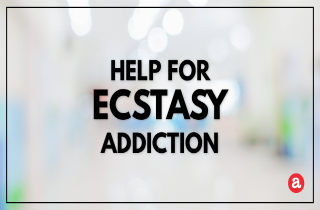Ecstasy is slang for a drug known as methylenedioxymethamphetamine, or MDMA for short. While many users may deny the habit forming potential of ecstasy, ecstasy can be psychologically and physically addictive. In fact, ecstasy addictive qualities include clinical characteristics that are remarkably similar to other stimulant addictions. So how can you begin treating ecstasy addiction? And where do you find help for ecstasy addiction?
Here, we review some practical ways you can help someone you think may be in need of ecstasy addiction treatment. We explore physical and psychological ecstasy addiction treatment and helplines that you can use. Additionally, we personally and promptly answer any questions you have about ecstasy treatments at the end of the article.
Getting help for ecstasy addiction
Although physical dependence on ecstasy is rare, you can experience ecstasy withdrawal syndrome even after your first use of ecstasy. In fact, use of ecstasy leaves you feeling fatigued and depleted. And after time, ecstasy addiction starts to affect your physical and mental health. While most users do not become physically dependent on ecstasy, psychological dependence drives repeated and chronic use. Additionally, overdosing is not uncommon among users and often can cause one to pass out from physical exhaustion or the body overheating.
How to help ecstasy addiction
There are multiple ways to help address ecstasy addiction. Possible therapies correspond to three phases of treatment: withdrawal, physical stabilization and psychological treatment.
1. Ecstasy withdrawal treatment
Many medical professionals believe ecstasy addiction to be strictly psychological. However, withdrawal symptoms from extreme ecstasy use or even a one-time binge can be very severe, often affecting cognitive function. During a binge, ecstasy can cause confusion, memory loss, fatigue and sleep deprivation, and loss of appetite. During a medically supervised ecstasy detox, you get ecstasy out of your body and have a tendency to want to sleep. Acute ecstacy withdrawal can also result in dysphoria, or an extreme dissatisfaction with life. While not life-threatening, it can be helpful to have medical supervision while withdrawing from ecstasy.
2. Physical stabilization
Physical stabilization occurs in the weeks and months after initial ecstasy withdrawal. However, during this time psychologcial symptoms of addiction can become more obvious. Long term use of ecstasy can cause symptoms such as anxiety, depression, irritability, confusion, and chronic drug cravings. One common problem that occurs during physical stabilization after ecstasy withdrawal is compulsion to use ecstasy again. Avoiding relapse by addressing thoughts and beliefs which cause obsessive thinking about ecstasy is helpful.
3. Psychological ecstasy addiction treatment
Ecstasy addiction is often regarded as mostly psychological and requires professional mental health intervention. In or outpatient therapy programs that combine in person visits, group meetings, or weekly phone calls can help address the mental obsession with esctasy. Joining a support group like Narcotics Anonymous is also always an option for those in need.
How to help an ecstasy addict
If you know someone whose use of ecstasy is having a negative impact on their life, address the issue with detachment and love. This is called an intervention. You can intervene informally or with the help of an addiction professional. It is important for an ecstasy addict to acknowledge their problem and the harm it is causing to their life and the lives of others around them. Talk about specific instances and focus on the facts. Try getting them help through a treatment facility. Getting help now can help eliminate their risk of getting jail time, losing their job, or getting injured.
You can receive help for ecstasy addiction by consulting with
- A family doctor
- A trusted community or religious leader
- Drug addiction psychologists or psychiatrists
- Drug addiction treatment centers near you
- Drug detox clinics near you
- Drug rehab programs near you
Ecstasy addiction help and helplines
Receiving the right help for ecstasy addiction is crucial during process of seeking treatment. You can contact 1-800-662-HELP (4357) to get connected to a 24 hour call center. This government hotline can assist you in finding treatment facilities or detoxification centers.
Help with ecstasy addiction questions
If you still have questions about getting help for ecstasy addiction, please feel free to comment below and we will get back to you in a timely manner. We try to respond to all questions personally.









Related Posts